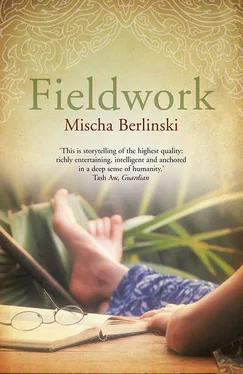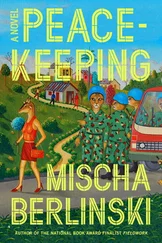Our disgruntlement with Chiang Mai persisted intensely for a month or so, until we installed a badminton court on our crabgrass lawn. From a local sporting goods dealer we bought a net, a pair of rackets, and a shuttlecock. To a warped and decaying mango tree we tied one end of the net, and the other end of the net we proposed to affix to a bamboo stake. But we were unable to cut the bamboo properly and were on the verging of retiring back to the house in failure when a very short, round-faced woman with enormous ears wearing a sarong and carrying a machete as long as her arm came running up to us. She was screeching violently. I wondered for a second if we were not perhaps interfering with a sacred bamboo grove. The creature was precisely the size and shape and almost the color of Yoda, an impression intensified by her village dialect of Thai, which seemed curiously to invert what Thai Made Simple had said was standard Thai word order. "Baiyom am I!" she howled. "Cut you I will!" In lunatic miscomprehension, Rachel and I reared back. But our fears were misplaced, as with a flashing whack of her rusting machete the Baiyom thing hacked into shape just the bamboo pole we needed. We had made our first friend.
In the Thai culture, we learned, hacking down a bamboo pole together is tantamount to a dinner invitation, as that evening to our surprise Baiyom arrived at the door of our house leading a delegation of neighbors. They came not from the other large concrete houses but from the simple one-room shacks beside the main road. On a low tray of woven bamboo Baiyom carried a bowl of cold cucumber soup, a spongy chili omelette, and a low mound of rice. The troupe settled themselves on the floor of the empty living room of our new home and admired the elegance of the concrete walls and plastic parquet flooring. One wall of the living room had been covered by the house's owner with floor-to-ceiling wallpaper depicting some alpine setting — cows, pines, snowy peaks. The scene elicited a low buzz of excited wonder from our new neighbors. They also inspected our bedroom and our bathroom, the guest bedroom and the kitchen, opened up all the closets, and tested the cooling properties of the refrigerator by touching the metal grilles. The group stayed until the early hours of the morning, singing folk songs, applauding loudly when we managed to lisp the simple three-word chorus, and asking repeatedly how much we paid in rent.
Everything the guidebooks had told us of Thai manners and gentility, Baiyom that evening proved wrong: the guidebooks had told us that one never demonstrates the soles of the feet in Thailand, but Baiyom stretched herself out full length on our parquet floor, her broad-bottomed calloused feet on open display. The fey and delicate Thai nature? Baiyom at the end of the meal let out a series of long belches, her little lips distended. "A good home this is," Baiyom declared. "Happy you are. Good fun we are making." The next evening, the group came again, and then the next; the heavy fog of our discontent lifted. To be persistently grumpy around these people just seemed churlish.
Rachel's school proved also, if not a disappointment, then a surprise: it was one of those odd institutions which sprout up so often in Thailand — places in every detail familiar from a Western analogue, but somehow unsettlingly wrong . About a third of the students were Thai, the sluggish scions of very wealthy families determined to give their children a Western education; these kids tended to arrive at around eleven, their homework carefully prepared by their Anglophone servants. Most of these kids had flunked out of Chiang Mai's other, better , international school. Another third were the children of employees of the American consulate, and the rest the offspring of elderly occidental retirees and their obscenely young Thai wives. Parents' Day at the school always had a strange vibe, as the blissed-out old-timers and the mustachioed DEA agents working the Golden Triangle exchanged soothing remarks on how well the kids were doing in the new environment this year, while the Thai parents congregated in the corners of the gymnasium and looked snooty.
But if the kids and their parents were a weird bunch, the faculty was a whole lot weirder, a haphazard collection of perhaps eighteen expatriates, all of them in Chiang Mai for no apparent reason other than that they had just run out of space. There was an Australian gym teacher who insinuated slyly that his days down under were well and good done, mate ; and the American from Vermont with a shaggy red beard who came to Thailand after it was discovered that his doctorate in sociology had been the product of plagiarism. He taught the kindergarten by means of a formal lecture, as if in memory of lost glory. He sat his class down, and explained briskly the history of the alphabet since the days of the Phoenicians. The kids sat in patient rows with big eyes, and understood nothing at all, until someone started to fidget and someone else started to cry. Mr. Robert from Missouri composed poetry in Thai, and was considering becoming a Buddhist monk; failing that, he said, he would devote himself in his old age to the Four Idyllic Occupations — reading, farming, fishing, and the gathering of firewood. There was an English teacher from Massachusetts who, if given half an opportunity, would discuss in extraordinary detail the inheritance he was expecting. He had already calculated the estate tax. He loathed the heat in Thailand and heavily spiced foods. I asked him once why he stayed. "I would go home, if only Mother would buy me a ticket," he said, with an air of Oriental fortitude. The Water Lily School was the kind of place where the stories all started "I was just coming for a year, to do something different, and I'm still here!" There is something about the life as a foreigner in Thailand that draws those who find themselves unwilling or unable to think about their 401(k)s; and in the leisure, freedom, and isolation that the Far East provides, these types swing inexorably toward the pendulum-edges of their souls.
But who am I to criticize? I was supporting myself, a little like Josh but with perhaps a touch less brio, by all manner of odd jobs: a Thai mogul paid me — don't even ask how this came about — to write summaries of American business books. This was the year that I learned how to motivate my employees and keep my supply chains supple and fluid, like jungle creepers. From time to time, I wrote features about colorful Chiang Mai characters for an English-language Bangkok newspaper, which, thinking that its audiences might prefer an authentic voice of Asia, published me under the nom de plume Somchai Wannapongsi; and Executive , a men's lifestyle magazine, hired me as their critic: I was the car critic, although I did not even have a driver's license; I was the music critic, although I cannot carry a tune; and I was the men's bespoke suit critic, although I am a — but perhaps enough said.
Our life was easy, calm, and cheap; we stayed the year in Chiang Mai, and I convinced Rachel to stay another. A new class of first-graders sat in the very small plastic desks and learned all about telling time. I wrote about the substantial advantages of double breasting and single piping. We got by.
Then Josh told me about Martiya van der Leun and my soul, too, began to swing.
Such is the power of a good story.
My hotel in Bangkok was quiet owing to the celebration of the Queen's Birthday. A mimeographed note had been slipped under my door: "On Thursday Aug 12, Her Majesty Queen Sirikit is highly adored by all Thai citizens who splendidly celebrate her Birthday each year." As a result, the notice continued, not all of the hotel's normal services would be available: room service was closed; the hotel astrologer, normally on hand between two and five in the afternoon, would not be offering readings; and the Tivoli Café would not lay out the usual breakfast buffet of waffles and congee. Although the notice did not mention it, the operator who handled outgoing long-distance calls was also unavailable. This was a cause of some frustration to me, as I had decided when I left Josh to call Elena van der Leun, Martiya's aunt in Holland, that very evening and follow up on his story. Executive ran a true-crime piece almost every month, and I thought that if I could figure out who Martiya had killed, I could pitch the story while still in Bangkok. But every time I picked up the rotary phone that connected me with the old-fashioned hotel switchboard, the line rang endlessly, and I imagined the telephone operator slipping off hand in hand with the astrologer to lay a wreath of orchids at one of Bangkok's numerous royal shrines. I spent the evening in the hotel bar, watching an Elvis look-alike competition held in the queen's honor.
Читать дальше












